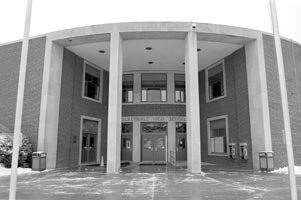NEWS- Bad rap: The long night before the trial
The night before last Tuesday's March 28 trial for three Albemarle boys ages 13-15 accused of conspiracy to commit murder and blow up a school, the parents were weighing possible outcomes, as they've been doing ever since their children were taken away in handcuffs nearly two months ago.
The prosecution had rested March 17, and at least one father believed his son stood a good chance of coming home. The boy's mother had busied herself that weekend getting his room ready and during his call home that evening the boy told her confidently, "Mom, I've had a good last day here."
His father calmly rattled off the list of hurdles his son might face if found guilty.
There's college, for one thing. "You have to put it on the application," the father said. His son had set his sights on joining the Air Force, but there's no enlisting with a felony on your record. Employers typically run background checks.
And the boy's county school had been traded for the Blue Ridge Detention Center, where a simple sign in the hall announces the "Education" section of the facility. Would his public school even take him back, especially when the charges included "blowing up a schoolhouse"?
One teacher, who wishes to remain anonymous, describes how frightened employees have been– on a daily basis– since the arrests.
One boy's parent attended a school board meeting the night before the first trial and feels officials hadn't closed the door on her son. "They were very fair," she says.
But while school employees who know the boy spoke out in his behalf, if he were found guilty, she says, her son would be unable to enroll in any county school ever again.
The decision to allow a student convicted of a felony to return to class is made by the School Board. "This occurs so rarely," says Steele Howen, executive director of county administrative services. "It's a school board issue. They meet and decide what happens."
The consequences for a minor are "devastating in many respects," says Bill Hicks, an attorney for one of the boys. While they don't lose their right to vote or other civil liberties, they may very well lose their friends, community support, and a host of educational and career opportunities.
One of the boys says he's afraid his personality has changed, and friends won't like him anymore. "I'm not going to act goofy anymore," he told his mother.
Since the 1990s, when adolescent crimes temporarily surged, childhood has been losing ground, according to Dan Macallair of the San Francisco-based Center on Juvenile and Criminal Justice. Even though adolescent crime is down across the country, Macallair says adults have continued a pattern of "over-reacting" to juvenile threats of violence.
Was there a less serious crime the boys could have been charged with? "Other things might have been charged," Hicks says, but "the easy answer is probably no."
"The prosecutor could've elected to try these kids as adults," notes Andy Block, director of the JustChildren program at the Charlottesville Legal Aid Justice Center, about the two boys who are over 14.
Because of the seriousness of the charges, Block puts a sentencing outcome at "50/50" whether a guilty verdict will send them to the Richmond correction center, or home under strict supervision.
"All of the options are available in this case," Block says– from lengthy incarceration to probation. In one possible scenario involving probation, known as "deferred disposition," kids who are found guilty can still have their records wiped clean when they turn 21.
Hicks stresses that a guilty verdict for any of the kids in this case is not synonymous with a felony conviction. That's only in adult court. In the language of juvenile justice, it's "a crime that would be a felony if it were committed by an adult."
As for what that all means to parents without their children, as one mother says, "I don't think we know the full impact yet."

Students convicted of felonies can return to county schools (such as Albemarle High, shown here) if the board allows their return, or it may send them to an alternative school, says assistant county attorney Mark Trank.
FILE PHOTO BY JEN FARIELLO
#